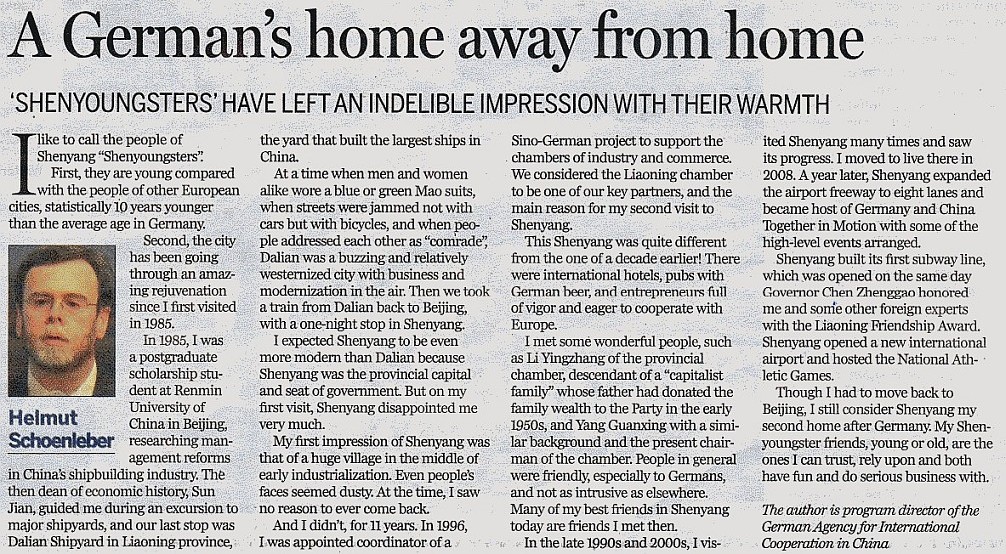I like to call the people of Shenyang “Shenyoungsters”. First, they are young compared with the people of European cities, statistically ten years younger than the average age of Germany. You will notice this when you go shopping at one of the malls or pedestrian zones of Shenyang: smiling at you will be mostly tall and pretty girls in their twenties (or at least looking as such) and smart trim young men. Second, their city has been going through an amazing rejuvenation since I first visited in 1985.
In 1985, I was a postgraduate scholarship student at Renmin University of China in Beijing, researching management reforms in the shipbuilding industry of China. The Dean of Economic History, Professor Sun Jian, guided me during an excursion to major shipyards, and our last stop was Dalian Shipyard in Liaoning province, the yard that built the largest ships of China.
At a time when men and women alike were wearing a blue or green Mao suit, when streets were jammed not with cars but with bicycles, when people addressed each other “comrade”, Dalian was a buzzing and relatively westernized city with business and modernization in the air. We interviewed Director Wang Youwei who had massively expanded the Shipyard and actually spoke some German. Afterwards, we took a train from Dalian back to Beijing, with a one-night stopover in Shenyang.
I expected Shenyang to be even more modern and globalized than Dalian, because Dalian was just a so-called “open” port city in Liaoning, while Shenyang was the provincial capital and seat of the government. But on my first visit, Shenyang disappointed me very much. My first impression of Shenyang was that of a huge village in the middle of early industrialization. Even the faces of people seemed dusty. At the time, I saw no reason to ever come back.
And I didn’t, for eleven years. In 1996, I was appointed coordinator of a Sino-German project to support chambers of industry and commerce. We considered the Liaoning chamber to be one of our key partners, main reason for my second visit to Shenyang. Now this Shenyang was quite different from the one of a decade before! There were international hotels, pubs with German beer, many entrepreneurs full of vigour and eager to cooperate with Europe. I met some wonderful people, such as Li Yingzhang of the provincial chamber, descendant of a “capitalist family” whose father had donated the family wealth to the Party in the early 1950s, or Yang Guanxing with a similar background, Chairman of the chamber today. People in general were friendly, especially to Germans, and not as intrusive as elsewhere. Many of my best friends in Shenyang today are friends I met at that time.
In the later 1990s and 2000s, I visited Shenyang many times and witnessed her progress. I moved to live there in 2008, to head the GIZ Shenyang Office and the GIZ LEPT Programme. A year later, Shenyang expanded the airport freeway to eight lanes and became host of “Germany and China – Together in Motion” with some of the high-level events arranged by GIZ. Shenyang built her first subway line, which was opened on the same day Governor Chen Zhenggao honoured me and some other foreign experts with the Liaoning Friendship Award. Shenyang opened a new, large international airport and hosted the National Athletic Games. I had to move back to Beijing, but still consider Shenyang my second home after Germany. My Shenyoungster friends, young or old, are the ones I can trust, rely upon, and both have fun and do serious business with.
Helmut Schönleber
